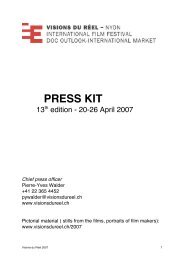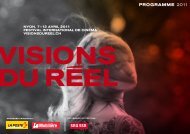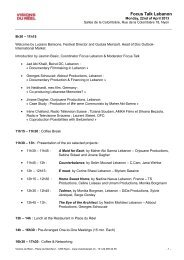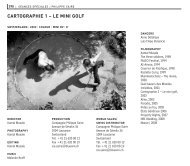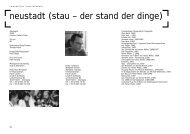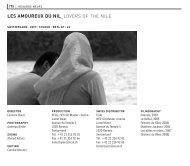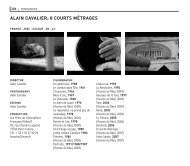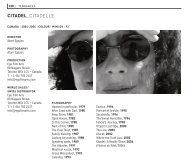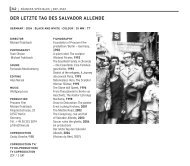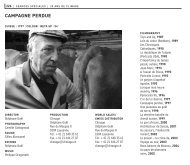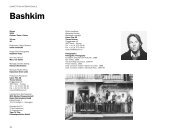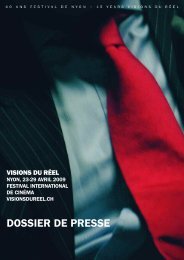Katalog 2013.pdf - Visions du Réel
Katalog 2013.pdf - Visions du Réel
Katalog 2013.pdf - Visions du Réel
You also want an ePaper? Increase the reach of your titles
YUMPU automatically turns print PDFs into web optimized ePapers that Google loves.
atelier – laila pakalnina<br />
199<br />
Laila Pakalnina<br />
Vela<br />
Latvia | 1991 | 10’ | 35 mm | No Dialogue<br />
The Linen<br />
Chaque jour, un homme livre <strong>du</strong> linge<br />
propre à un hôpital pour enfants. Il est<br />
ensuite traité, sélectionné, transporté.<br />
Le monde entier semble tourner autour<br />
de ce linge. On observe toutes les<br />
étapes à un rythme constant, grâce au<br />
travail inventif de la caméra et depuis<br />
de multiples points de vue. Quelques<br />
plans d’enfants aux fenêtres rappellent<br />
l’endroit où nous nous trouvons. Très<br />
vite, en suivant le linge, on développe<br />
un sentiment de profonde empathie. «Je<br />
voulais faire un film sur la vie. J’avais<br />
donc besoin de montrer la mort, mais je<br />
ne voulais pas montrer les gens mourir.<br />
Nous sommes allés dans un hôpital pour<br />
enfants et nous nous sommes dit: nous<br />
n’allons pas entrer dans cet hôpital pour<br />
montrer le visage de la souffrance. Il doit<br />
être possible de tout ressentir, même de<br />
l’extérieur.» (LP)<br />
Jeden Tag beliefert ein Mann ein Kinderkrankenhaus<br />
mit sauberer Wäsche.<br />
Diese wird dann sortiert, zugeteilt und<br />
transportiert. Die gesamte Welt scheint<br />
sich um Wäsche zu drehen. Durch die<br />
einfallsreiche Kameraführung und die<br />
vielfältigen Blickpunkte sehen wir sämtliche<br />
Phasen in konstantem Rhythmus.<br />
Einige Aufnahmen von Kindern<br />
an den Fenstern erinnern daran, wo wir<br />
uns befinden. Nach der Wäsche entwickelt<br />
sich rasch ein tiefes Mitgefühl.<br />
«Ich wollte einen Film über das Leben<br />
machen. Daher musste ich den Tod<br />
zeigen, wollte jedoch keine sterbenden<br />
Menschen zeigen. Wir gingen in ein Kinderkrankenhaus<br />
und sagten uns dabei,<br />
dass wir nicht in dieses Krankenhaus<br />
gehen werden, um das Gesicht des<br />
Leidens zu zeigen. Es muss möglich<br />
sein, alles auch dann zu fühlen, wenn<br />
man draussen bleibt.» (LP)<br />
Every day a man delivers clean linen to a<br />
children’s hospital. It is then processed,<br />
selected, transported. The whole world<br />
seems to turn around the laundry. We<br />
observe all the phases at a constant<br />
pace, through the inventive camera work<br />
and from multiple points of view. A few<br />
shots of children at the windows remind<br />
us of the nature of the place we are.<br />
Soon, following the laundry, we develop<br />
a feeling of deep empathy. “I wanted to<br />
make a film about life. So I needed to<br />
show death, but I didn’t want to show<br />
people dying. We went to a children’s<br />
hospital and said to ourselves – we are<br />
not going to enter this hospital to show<br />
the face of suffering. It must be possible<br />
to feel everything even staying outside.”<br />
(LP)<br />
Screenplay<br />
Laila Pakalnina<br />
Cinematography<br />
Gints Berzins<br />
Sound<br />
Uldis Silins<br />
Editing<br />
Inita Murniece<br />
Pro<strong>du</strong>ction<br />
VGIK, RDFS<br />
paolo moretti<br />
Contact<br />
International Relations<br />
National Film Centre of Latvia<br />
+371 67358878<br />
nfc@nfc.gov.lv<br />
www.latfilma.lv/nfc



